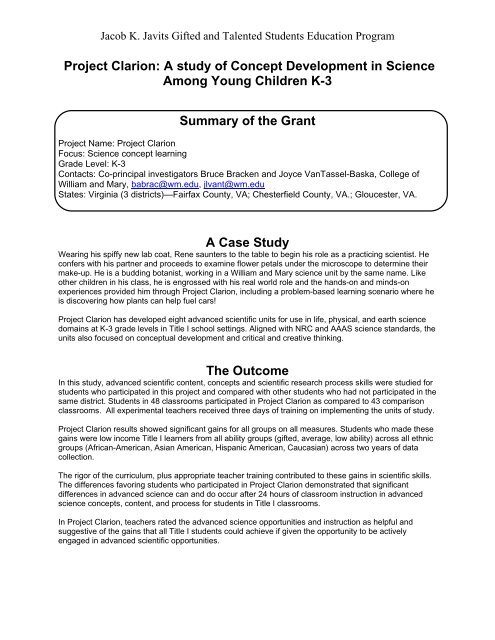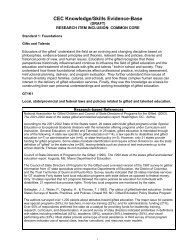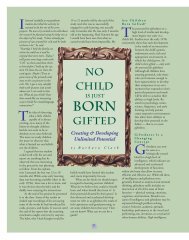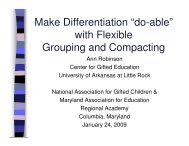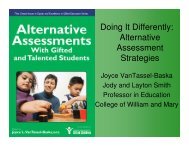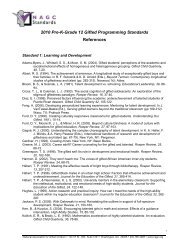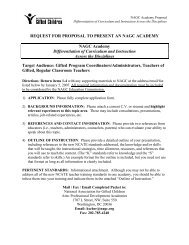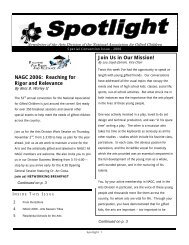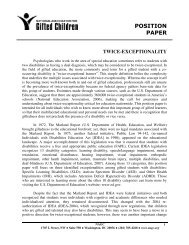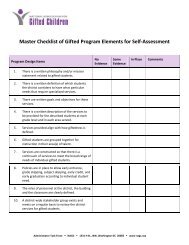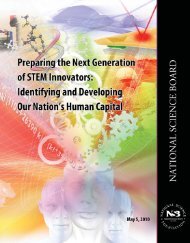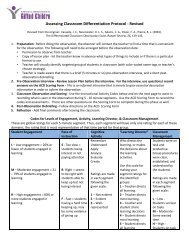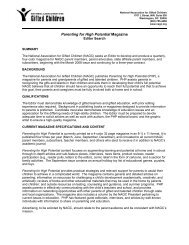Advanced Readers At Risk: Rescuing an Underserved ... - NAGC
Advanced Readers At Risk: Rescuing an Underserved ... - NAGC
Advanced Readers At Risk: Rescuing an Underserved ... - NAGC
You also want an ePaper? Increase the reach of your titles
YUMPU automatically turns print PDFs into web optimized ePapers that Google loves.
Jacob K. Javits Gifted <strong>an</strong>d Talented Students Education Program<br />
Project Clarion: A study of Concept Development in Science<br />
Among Young Children K-3<br />
Summary of the Gr<strong>an</strong>t<br />
Project Name: Project Clarion<br />
Focus: Science concept learning<br />
Grade Level: K-3<br />
Contacts: Co-principal investigators Bruce Bracken <strong>an</strong>d Joyce V<strong>an</strong>Tassel-Baska, College of<br />
William <strong>an</strong>d Mary, babrac@wm.edu, jlv<strong>an</strong>t@wm.edu<br />
States: Virginia (3 districts)—Fairfax County, VA; Chesterfield County, VA.; Gloucester, VA.<br />
A Case Study<br />
Wearing his spiffy new lab coat, Rene saunters to the table to begin his role as a practicing scientist. He<br />
confers with his partner <strong>an</strong>d proceeds to examine flower petals under the microscope to determine their<br />
make-up. He is a budding bot<strong>an</strong>ist, working in a William <strong>an</strong>d Mary science unit by the same name. Like<br />
other children in his class, he is engrossed with his real world role <strong>an</strong>d the h<strong>an</strong>ds-on <strong>an</strong>d minds-on<br />
experiences provided him through Project Clarion, including a problem-based learning scenario where he<br />
is discovering how pl<strong>an</strong>ts c<strong>an</strong> help fuel cars!<br />
Project Clarion has developed eight adv<strong>an</strong>ced scientific units for use in life, physical, <strong>an</strong>d earth science<br />
domains at K-3 grade levels in Title I school settings. Aligned with NRC <strong>an</strong>d AAAS science st<strong>an</strong>dards, the<br />
units also focused on conceptual development <strong>an</strong>d critical <strong>an</strong>d creative thinking.<br />
The Outcome<br />
In this study, adv<strong>an</strong>ced scientific content, concepts <strong>an</strong>d scientific research process skills were studied for<br />
students who participated in this project <strong>an</strong>d compared with other students who had not participated in the<br />
same district. Students in 48 classrooms participated in Project Clarion as compared to 43 comparison<br />
classrooms. All experimental teachers received three days of training on implementing the units of study.<br />
Project Clarion results showed signific<strong>an</strong>t gains for all groups on all measures. Students who made these<br />
gains were low income Title I learners from all ability groups (gifted, average, low ability) across all ethnic<br />
groups (Afric<strong>an</strong>-Americ<strong>an</strong>, Asi<strong>an</strong> Americ<strong>an</strong>, Hisp<strong>an</strong>ic Americ<strong>an</strong>, Caucasi<strong>an</strong>) across two years of data<br />
collection.<br />
The rigor of the curriculum, plus appropriate teacher training contributed to these gains in scientific skills.<br />
The differences favoring students who participated in Project Clarion demonstrated that signific<strong>an</strong>t<br />
differences in adv<strong>an</strong>ced science c<strong>an</strong> <strong>an</strong>d do occur after 24 hours of classroom instruction in adv<strong>an</strong>ced<br />
science concepts, content, <strong>an</strong>d process for students in Title I classrooms.<br />
In Project Clarion, teachers rated the adv<strong>an</strong>ced science opportunities <strong>an</strong>d instruction as helpful <strong>an</strong>d<br />
suggestive of the gains that all Title I students could achieve if given the opportunity to be actively<br />
engaged in adv<strong>an</strong>ced scientific opportunities.


